The Musicology Department sponsors a Symposium series with prominent guest speakers from other institutions, plus works-in-progress talks from students and faculty; and professional development workshops organized by the Graduate Musicology Association. All of these events are open to the Eastman community and take place on Thursdays at 4:00 p.m. in NSL 404 (Sibley Library seminar room).
The Musicale: “Performance Plus” series showcases outstanding young performers from the Eastman School of Music, “plus” lively in-concert commentary provided by the school’s Ph.D. students in Musicology. Performances take place at 3 p.m. on the third Sunday of each month of the academic year at the George Eastman Museum (900 East Ave.), and the concert is included with museum admission. The Musicale: “Performance Plus” series at the George Eastman Museum is made possible in part by Joanna and Michael Grosodonia.
Events during neither of these standing times are marked with asterisks.
January 18, 2024
Graduate Musicology Association: Formulating productive discussion questions
January 25, 2024
Works-in-Progress: Anaar Desai-Stephens
“In whose voice? Filmi Fidelity, Vocal Uniqueness, and the Stakes of Vocality”
February 1, 2024
Works-in-Progress: Roger Freitas
“Barbara Strozzi, cortigiana per musica”
February 8, 2024
Graduate Musicology Association: Abstract Workshop
February 15, 2024
Works-in-Progress: Paul David Flood
“‘Everybody Wanna Move Like Us!’: Black Internationalism and Afro-Diasporic Solidarity in the Eurovision Song Contest”
February 18, 2024
“Performance Plus” concert
Sheridan Zahl hosts the Etna Quartet in a program of works for saxophone quartet by Fernande Decruck, Daniel López, and others.
February 29, 2024
Musicology Symposium: Kimberly Hannon Teal (University of North Texas)
Jazz Festivals and Whiteness in Black Urban Spaces
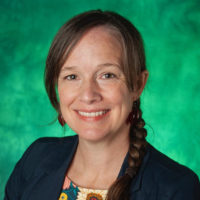
Jazz is inextricably linked to the history of race in America, and that history of race is largely defined by places and the ways in which people move through or are restricted by them. As George Lipsitz writes, “race is produced by space…it takes places for racism to take place.”[1] Jazz’s unique blend of African, European, and indigenous elements was forged through cross-cultural interactions characterized by the deeply unequal power relations of colonization and slavery and their legacies. While the middle decades of the twentieth century saw the music thrive in urban club scenes, jazz festivals now offer some of the most common and consistent spaces for jazz performance and listening. In part because of their foregrounding of place in the context of African American culture, jazz festivals offer opportunities to reconsider the nature of and stories told around race and place. As sites of temporary integration in urban areas that remain largely segregated more than half a century after the Civil Rights Movement, they can play a role in confronting, illuminating, obscuring, or exacerbating racial inequalities.
In this talk, I will detail two opposing strategies for presenting jazz festivals in majority-Black urban places. I argue that the New Orleans Jazz and Heritage Festival aims for a Robin Hood-like model that maximizes income from wealthy tourists to bring money into an impoverished local economy while the Detroit Jazz Festival targets a local audience through free performances bankrolled by philanthropic support. In one scenario, local residents may benefit from a trickle-down of cash, and in the other they are offered jazz as a gift alongside a smaller influx of money to the hospitality industry. In both, whiteness is a significant thread in the tangled knots connecting, music, money, people, and places.
Sponsored by the Central New York Humanities Corridor from an award by the Mellon Foundation. For more information about this event or other activities of the Jazz and Culture working group, please contact Darren Mueller (dmueller@esm.rochester.edu)
March 17, 2024
“Performance Plus” concert
Bethany Brinson hosts the Ebbrovory Trio in a program of works for violin-clarinet-piano trio by Glenn Buhr, David Ott, and Charles Young.
March 28, 2024
Musicology Symposium: Alejandro Madrid (Harvard University)
“Listening through the Noise of the Colonial Archive: Things, Sound Objects, Legacy, and the Konrad T. Preuss Collection at the Berliner Phonogramm-Archiv”
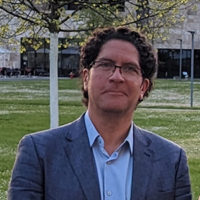
Archives and the information they contain are designed, structured, and organized according to narratives that shape the type of knowledge that their users are expected to obtain from them. Thus, the objects and documents in an archive usually tell and re-tell stories that performatively reproduce the larger ideological frameworks informing the dynamics between objects, documents, representation, and users. The central concern in this lecture is whether it is possible (and how) for archives to tell stories different to the ones they are designed to tell us. In order to find an answer, I study the collections of Naayeri and Wixárika chants recorded for the Ethnologisches Museum Berlin by Theodor Konrad Preuss (1869-1938) between 1905 and 1907 and housed by the Berliner Phonogramm-Archiv, and propose that the way the sound objects in those collections were created responds more to Preuss’ expectations regarding these indigenous communities than to how these communities conceptualize their music and ritual practices. As such, the archive tells us the story Preuss wanted to tell us and nothing more. I close the presentation with an exploration of how Mexican anthropologist Margarita Valdovinos has engaged this archive since the 2000s, and propose that her interrogation of its constituent materials, with the end of repatriating its recordings to Náayeri and Wixárika communities in Mexico, is a model of how to ask questions from archives to force them to tell us stories different from those embedded in their design, structure, and materiality.
Alejandro L. Madrid is the Walter W. Naumburg Professor of Music at Harvard University. He is a cultural theorist of sound and music working in Latin American and Latinx studies. He is a recipient of the Humboldt Research Award, presented by Germany’s Alexander von Humboldt Foundation in recognition of lifelong accomplishments in research and teaching; a Guggenheim Fellowship; the Dent Medal, awarded by the International Musicological Society and the UK’s Royal Musical Association for “outstanding contributions to musicology”; Cuba’s Premio de Musicología Casa de las Américas; as well as top awards from the American Musicological Society, the Latin American Studies Association, the International Association for the Study of Popular Music, the ASCAP Foundation, and the Society for Ethnomusicology.
April 3, 2024
“Encounters with the Schumanns: Listening, Thinking, Interpreting”
Listening (Roundtable, 9:30am-11:30am in Howard Hanson Hall)
Visiting scholars Benedict Taylor (University of Edinburgh), Roger Moseley (Cornell University), Michael Gallope (University of Minnesota), and Seth Brodsky (University of Chicago), along with Loretta Terrigno and Sarah Marlowe from ESM Theory, will play pieces by Clara and Robert Schumann and give short talks about the thought processes the pieces set in motion for them. Holly Watkins (ESM Musicology) will moderate.
Thinking (Seminar, 12:30pm-3:30pm in NSL 404)
During Prof. Watkins’s regular Music and Philosophy seminar, the four visiting scholars, doctoral students, and guests will discuss the philosophical resonances of the Schumanns’ music as evinced in selected readings and repertory. The seminar is closed to the public; pre-registration is required for non-enrolled graduate students and faculty.
Interpreting (Concert, 3:30pm-5:00pm in Howard Hanson Hall)
Concert showcasing songs and chamber pieces by Clara and Robert performed by Eastman DMA students on both modern and historical instruments.
Along with the Musicology Department, this event is being co-sponsored by the Music Theory Department and the Piano Department.
April 4, 2024
Graduate Musicology Association: Introduction to the Academic Job Market
April 11, 2024
Musicology Symposium: Daphne Brooks (Yale University) CANCELLED
“Rhapsody & Ruin: Porgy & Bess and the Story of America”
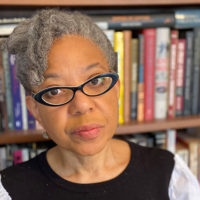 This lecture traces the sonic genealogy of Black women’s vocality in Porgy & Bess, and it explores the oft-overlooked and undertheorized historical, social, material and political landscape in which Gershwin and Heyward each cultivated their ideas about race, gender, class and culture, translating these concepts into America’s legendary and also infamous “folk opera.” Crucially, it also considers the counter-performance politics and poetics of Black women musicians and artists who navigated the Porgy & Bess archive.
This lecture traces the sonic genealogy of Black women’s vocality in Porgy & Bess, and it explores the oft-overlooked and undertheorized historical, social, material and political landscape in which Gershwin and Heyward each cultivated their ideas about race, gender, class and culture, translating these concepts into America’s legendary and also infamous “folk opera.” Crucially, it also considers the counter-performance politics and poetics of Black women musicians and artists who navigated the Porgy & Bess archive.
Daphne A. Brooks is the William R. Kenan, Jr. Professor of African American Studies, American Studies, Women’s, Gender, and Sexuality Studies, and Music at Yale University. She is the author of Bodies in Dissent: Spectacular Performances of Race and Freedom, 1850-1910 (Durham, NC: Duke UP, 2006), winner of The Errol Hill Award for Outstanding Scholarship on African American Performance from ASTR; Jeff Buckley’s Grace (New York: Continuum, 2005) and Liner Notes for the Revolution: The Intellectual Life of Black Feminist Sound (Harvard University, February 2021). The latter is the winner of an astounding eleven book awards and prizes. Brooks has authored numerous articles on race, gender, performance and popular music culture and wrote liner notes for The Complete Tammi Terrell (Universal A&R, 2010) and Take a Look: Aretha Franklin Complete on Columbia (Sony, 2011), each of which has won the ASCAP Deems Taylor Award for outstanding music writing.
This event is made possible with support from the Eastman Departmental Inclusion Initiative.
April 18, 2024
Musicology Symposium: Maria Sonevytsky (Bard College)
“Indigenous Resurgence or Criminal Pop?: Mapping the Music of Jamala’s QIRIM”
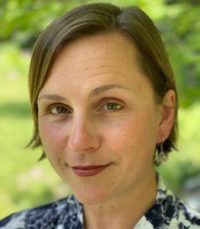 What kind of threat can a pop star pose? In late 2023, the Ukrainian and Crimean Tatar pop star Jamala was arrested in absentia by the Russian state. Her crime? She allegedly spread “fakes” about the Russian Army on her social media after mass civilian atrocities in Bucha and other Ukrainian sites came to light in April of 2022. While Jamala was hardly the only Ukrainian celebrity to post about her anger and despair, she was the only one to be arrested in absentia by the Russian state a year later. In this talk, I explore how Jamala’s unique position within the popular music industry as a representative of her Indigenous Crimean Tatar community has made her an explicit target of the Russian state dating back to 2016, when she rose to international prominence as the winner of the Eurovision Song Contest. Crimea, the strategic and contested Black Sea peninsula that was illegally annexed by Russia from Ukraine in 2014, is seen by many political analysts as a key site in the ongoing Russian war against Ukraine. Just months before her 2023 arrest was made public, Jamala released a new album named after the peninsula, titled QIRIM. The album attempts to re-territorialize Crimean Tatar folk songs in ways both literal and metaphorical, thus building a case for Indigenous resurgence from a position of territorial exile. This resurgence avoids what Sheryl L. Lightfoot (Keweenaw Bay Anishinaabe) calls the “pessimism traps” of some Indigenous resurgence theory, instead imagining Crimean Tatar Indigeneity as part of a global movement for Indigenous rights. I argue that Jamala’s musical politics mount a profound threat to Russian narratives that attempt to construct Crimea as historically—and therefore inevitably—Russian. Jamala’s QIRIM maps a different future for Crimea: by reinvigorating Indigenous claims on the past, and by deepening ties of postcolonial solidarity with Ukraine.
What kind of threat can a pop star pose? In late 2023, the Ukrainian and Crimean Tatar pop star Jamala was arrested in absentia by the Russian state. Her crime? She allegedly spread “fakes” about the Russian Army on her social media after mass civilian atrocities in Bucha and other Ukrainian sites came to light in April of 2022. While Jamala was hardly the only Ukrainian celebrity to post about her anger and despair, she was the only one to be arrested in absentia by the Russian state a year later. In this talk, I explore how Jamala’s unique position within the popular music industry as a representative of her Indigenous Crimean Tatar community has made her an explicit target of the Russian state dating back to 2016, when she rose to international prominence as the winner of the Eurovision Song Contest. Crimea, the strategic and contested Black Sea peninsula that was illegally annexed by Russia from Ukraine in 2014, is seen by many political analysts as a key site in the ongoing Russian war against Ukraine. Just months before her 2023 arrest was made public, Jamala released a new album named after the peninsula, titled QIRIM. The album attempts to re-territorialize Crimean Tatar folk songs in ways both literal and metaphorical, thus building a case for Indigenous resurgence from a position of territorial exile. This resurgence avoids what Sheryl L. Lightfoot (Keweenaw Bay Anishinaabe) calls the “pessimism traps” of some Indigenous resurgence theory, instead imagining Crimean Tatar Indigeneity as part of a global movement for Indigenous rights. I argue that Jamala’s musical politics mount a profound threat to Russian narratives that attempt to construct Crimea as historically—and therefore inevitably—Russian. Jamala’s QIRIM maps a different future for Crimea: by reinvigorating Indigenous claims on the past, and by deepening ties of postcolonial solidarity with Ukraine.
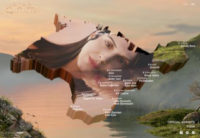 Maria Sonevytsky is Associate Professor of Anthropology and Music at Bard College. She has published two books: Wild Music: Sound and Sovereignty in Ukraine (2019, winner of the 2020 American Musicological Society’s Lockwood First Book Prize) and Vopli Vidopliassova’s Tantsi (2023), accompanied by the first formal release of the band’s cult 1989 cassette album Tantsi on the California-based label Org Music. Prof. Sonevytsky is writing a new book titled Singing for Lenin in Soviet Ukraine: Children, Music, and the Communist Future, for which she was awarded a National Endowment for the Humanities grant in 2022. Earlier, she produced and sang on The Chornobyl Songs Project: Living Songs from a Lost World (released in 2015 on Smithsonian Folkways). In the late 2000s, she developed a multi-media exhibition on Crimean Tatar repatriates called “No Other Home” with the photographer Alison Cartwright Ketz which was shown at museums in Bucharest, Kyiv, New York, and online on the journal Triple Canopy. She has written multiple articles and essays on Ukrainian music, culture, and history, including, recently, public-facing pieces on the ethics of performing Russian Imperial musical works during the Russian war on Ukraine. In addition to her scholarly work, she performs as a singer and accordionist.
Maria Sonevytsky is Associate Professor of Anthropology and Music at Bard College. She has published two books: Wild Music: Sound and Sovereignty in Ukraine (2019, winner of the 2020 American Musicological Society’s Lockwood First Book Prize) and Vopli Vidopliassova’s Tantsi (2023), accompanied by the first formal release of the band’s cult 1989 cassette album Tantsi on the California-based label Org Music. Prof. Sonevytsky is writing a new book titled Singing for Lenin in Soviet Ukraine: Children, Music, and the Communist Future, for which she was awarded a National Endowment for the Humanities grant in 2022. Earlier, she produced and sang on The Chornobyl Songs Project: Living Songs from a Lost World (released in 2015 on Smithsonian Folkways). In the late 2000s, she developed a multi-media exhibition on Crimean Tatar repatriates called “No Other Home” with the photographer Alison Cartwright Ketz which was shown at museums in Bucharest, Kyiv, New York, and online on the journal Triple Canopy. She has written multiple articles and essays on Ukrainian music, culture, and history, including, recently, public-facing pieces on the ethics of performing Russian Imperial musical works during the Russian war on Ukraine. In addition to her scholarly work, she performs as a singer and accordionist.
April 21, 2024
“Performance Plus” concert
Hannah Harnest hosts the Silverwood Duo in a program of works for flute and guitar by Toru Takemitsu, Katherine Hoover, and Eric Sessler.
April 25, 2024
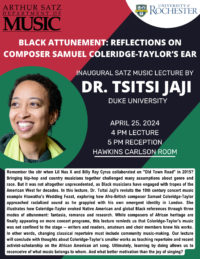
This event is co-sponsored by the Department of Musicology.
May 2, 2024
**7:30pm, Ray Wright Room
“A Yom HaShoah Remembrance Concert: Celebrating Jewish Culture through Classical Liturgical Music and Yiddish Art Song”
Throughout the 20th and 21st centuries, Jewish Conservative and Reform congregations in America have been active in the creation of new settings of Hebrew prayer. Cantor Samuel Rosenbaum from Temple Beth El in Rochester was a leading figure in this movement. Commemorating International Holocaust Remembrance Day, this lecture recital by Hannah Harnest (PhD student in Musicology) will feature Rosenbaum’s works, as well as those by Eastman alumnus and composer Michael Isaacson and Eastman professor emeritus Samuel Adler. The event further highlights the music of Lazar Weiner, one of the most important creators and advocates of Yiddish art song.
May 12, 2024
“Performance Plus” concert
“Lands and Legends in Song”
Program hosted by Bethany Brinson
A vocal recital with music by Franz Schubert, Franz Liszt, Robert and Clara Schumann and others.
Hannah Moreno, soprano
Anna Park, piano
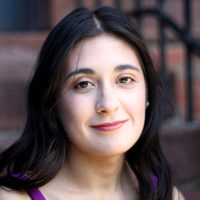

May 19, 2024
“Performance Plus” concert
Hannah Harnest hosts Iris Winds in a program of works for wind quintet.
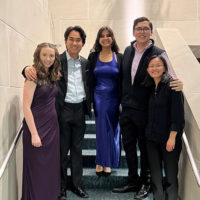 Iris Winds: Music for wind quintet by Claude Debussy, Carl Nielsen, and Valerie Coleman
Iris Winds: Music for wind quintet by Claude Debussy, Carl Nielsen, and Valerie Coleman
Brooke Walden, flute
Alex Kang, oboe
Sophie Fears, clarinet
Austin Struble, bassoon
Cristina Vieytez, horn
September 17, 2023
Musicale: “Performance Plus” Concert
Music for Piano Four Hands by Gabriel Fauré, Antonin Dvořák, and Claude Debussy
Program hosted by Bethany Brinson
Hyunmin Lee, piano
Mizi Li, piano
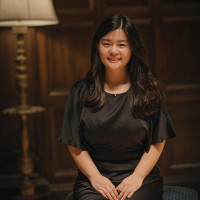

September 28, 2023
Musicology Symposium: Patricia Caicedo
Deconstructing the center and the peripheries: A proposal for a ‘4E’ performance practice of the Latin American art song
 In the 18th century, human sciences appropriated a physics model to study subjects from an impartial and aseptic point of view. A dialectic was established between the center and the peripheries, the center occupied by Western Europe and the rest of the world, the ¨peripheries¨ associated with”premodern” cultural forms—their ways of knowing de-legitimized and classified on a lower value scale. Through performance analysis of Latin American art song, this talk demonstrates how the center-periphery dialectic is expressed not only in the curricula and the classification of songs but also in the uses of the body and the voice. We will conclude with a proposal for its interpretation anchored in the 4Es of cognition —embedded, enacted, embodied, and extended—that departs from the knowledge of the context of the creation of the works.
In the 18th century, human sciences appropriated a physics model to study subjects from an impartial and aseptic point of view. A dialectic was established between the center and the peripheries, the center occupied by Western Europe and the rest of the world, the ¨peripheries¨ associated with”premodern” cultural forms—their ways of knowing de-legitimized and classified on a lower value scale. Through performance analysis of Latin American art song, this talk demonstrates how the center-periphery dialectic is expressed not only in the curricula and the classification of songs but also in the uses of the body and the voice. We will conclude with a proposal for its interpretation anchored in the 4Es of cognition —embedded, enacted, embodied, and extended—that departs from the knowledge of the context of the creation of the works.
Patricia Caicedo is a soprano and musicologist whose scholarship and performances center on Latin American and Iberian art song. She has released eleven albums and published numerous scholarly editions of scores and books, including The Latin American Art Song: Sounds of the Imagined Nations, the definitive history on its subject. She is also an avid performer of these works, having sung around the world in addition to founding and directing the Barcelona Festival of Song, which focuses on the performance and study of Latin American and Iberian art songs in Spanish, Catalan, and Portuguese. She is the host of the podcast Latin American and Iberian Art Song in which she interviews composers and leading experts from across the world. Her interest in exploring the possibilities of technology brought her to create Mundo Arts, a company that developed in to a music publishing house, a record label, and an online store. Patricia has created an international network of contacts with institutions, researchers, and artists worldwide, managing numerous projects in Spain, Latin America, and the US. Patricia holds a Ph.D. in Musicology from the Universidad Complutense de Madrid and a Medical Doctor’s degree from the Escuela Colombiana de Medicina.
October 12, 2023
Musicology Symposium: Gregory Barnett
Pitch Aggregates in Italian Theory and Barbara Strozzi’s Tonal Style
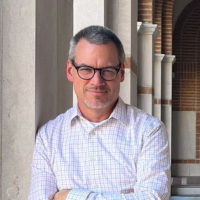
This presentation explores the use and eventual abandonment of the two inherited pitch aggregates – canto per bemolle (♭, that is, a signature of a single flat) and canto per bequadro (♮, or a void signature) – among seventeenth-century Italian composers. Its focus is the changing tonal practice of Barbara Strozzi. On the basis of earlier testimony by Giovanni Lanfranco (1533) and Gioseffo Zarlino (1558), we understand that bemolle and bequadro represent sub-systems within the Guidonian gamut. Adriano Banchieri (1613) testifies further that they denote the flatward or sharpward tonal orientations of a composition that result in its different modulations and points of tonal focus. According to this distinction of orientations between bemolle or bequadro pitch aggregates, pieces that share the same final and quality of third above it but differ in their single flat or void signature demonstrate contrasting tonalities (for example, Strozzi’s “Tra le speranze e’l timore,” from Op. 2 and “Aure già che non posso,” Op. 8).
This much outlines the tradition of pitch aggregates that served as Strozzi’s point of departure. In her changing notational practice and tonal-harmonic style between the 1640s and 1660s, we see the widening gap between bemolle/bequadro and eventual keys. The characteristics of different pieces by Strozzi in C with a minor third (“Consiglio amoroso,” from Op. 1, versus “Pensiero troppo audace,” Op. 6) or her manner of distinguishing major- and minor-third tonalities (“Sul Rodano severo”), for example, reveal a developing idiom of diversified pitch content and strengthened tonal-harmonic focus. The larger picture and Strozzi’s place within it illustrate, on the one hand, how she typifies a pathway of tonal evolution in seventeenth-century music, a symptom of which lies in how composers notated key signatures. On the other hand, Strozzi stands out in her era – perhaps uniquely – in the exotic and even bizarre harmonic features that underlie her vivid text-expressive style.
Gregory Barnett is Professor of Musicology at the Shepherd School of Music, Rice University. He is the author of Bolognese Instrumental Music, 1660-1710: Spiritual Comfort, Courtly Delight, and Commercial Triumph (Ashgate) and is a contributor to The Cambridge History of Western Music Theory, The Cambridge History of Seventeenth-Century Music, Geminiani Studies (Ut Orpheus Edizioni), Regole Armoniche (1775) by Vincenzo Manfredini (Brepols), and The Early Keyboard Sonata in Italy (Brepols). He has also published articles in the Journal of the American Musicological Society, Early Music, The Journal of Musicology, Theoria, Oxford Bibliographies Online, and the Basler Jahrbuch für Historische Musikpraxis. His interests include the history of modal theory and tonal organization in seventeenth-century music, Baroque-era instrumental music and instruments, and historical performance practice. His research has been supported by awards from the American Council of Learned Societies, the Bellagio Center of the Rockefeller Foundation, the National Endowment for the Humanities, the Fulbright Program, and the American Musicological Society.
October 15, 2023
Musicale: “Performance Plus” Concert
Piano trios by Beethoven, Mendelssohn, and Smetana
Program hosted by Sheridan Zahl
Performed by the Triptych Trio
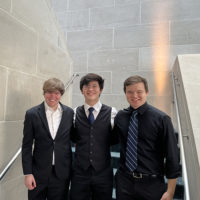
November 19, 2023
Musicale: “Performance Plus” Concert
String Quartets by Mozart and Brahms
Program hosted by Sheridan Zahl
Performed by the Maple Quartet, the Eastman School of Music’s Celentano Honors Quartet
December 17, 2023
Musicale: “Performance Plus” Concert
Piano trios by Maurice Ravel and Jennifer Higdon
Program hosted by Hannah Harnest
Performed by the Luna Trio
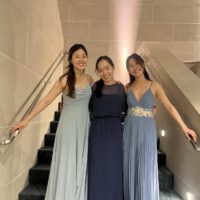


 This lecture traces the sonic genealogy of Black women’s vocality in Porgy & Bess, and it explores the oft-overlooked and undertheorized historical, social, material and political landscape in which Gershwin and Heyward each cultivated their ideas about race, gender, class and culture, translating these concepts into America’s legendary and also infamous “folk opera.” Crucially, it also considers the counter-performance politics and poetics of Black women musicians and artists who navigated the Porgy & Bess archive.
This lecture traces the sonic genealogy of Black women’s vocality in Porgy & Bess, and it explores the oft-overlooked and undertheorized historical, social, material and political landscape in which Gershwin and Heyward each cultivated their ideas about race, gender, class and culture, translating these concepts into America’s legendary and also infamous “folk opera.” Crucially, it also considers the counter-performance politics and poetics of Black women musicians and artists who navigated the Porgy & Bess archive. What kind of threat can a pop star pose? In late 2023, the Ukrainian and Crimean Tatar pop star Jamala was arrested in absentia by the Russian state. Her crime? She allegedly spread “fakes” about the Russian Army on her social media after mass civilian atrocities in Bucha and other Ukrainian sites came to light in April of 2022. While Jamala was hardly the only Ukrainian celebrity to post about her anger and despair, she was the only one to be arrested in absentia by the Russian state a year later. In this talk, I explore how Jamala’s unique position within the popular music industry as a representative of her Indigenous Crimean Tatar community has made her an explicit target of the Russian state dating back to 2016, when she rose to international prominence as the winner of the Eurovision Song Contest. Crimea, the strategic and contested Black Sea peninsula that was illegally annexed by Russia from Ukraine in 2014, is seen by many political analysts as a key site in the ongoing Russian war against Ukraine. Just months before her 2023 arrest was made public, Jamala released a new album named after the peninsula, titled QIRIM. The album attempts to re-territorialize Crimean Tatar folk songs in ways both literal and metaphorical, thus building a case for Indigenous resurgence from a position of territorial exile. This resurgence avoids what Sheryl L. Lightfoot (Keweenaw Bay Anishinaabe) calls the “pessimism traps” of some Indigenous resurgence theory, instead imagining Crimean Tatar Indigeneity as part of a global movement for Indigenous rights. I argue that Jamala’s musical politics mount a profound threat to Russian narratives that attempt to construct Crimea as historically—and therefore inevitably—Russian. Jamala’s QIRIM maps a different future for Crimea: by reinvigorating Indigenous claims on the past, and by deepening ties of postcolonial solidarity with Ukraine.
What kind of threat can a pop star pose? In late 2023, the Ukrainian and Crimean Tatar pop star Jamala was arrested in absentia by the Russian state. Her crime? She allegedly spread “fakes” about the Russian Army on her social media after mass civilian atrocities in Bucha and other Ukrainian sites came to light in April of 2022. While Jamala was hardly the only Ukrainian celebrity to post about her anger and despair, she was the only one to be arrested in absentia by the Russian state a year later. In this talk, I explore how Jamala’s unique position within the popular music industry as a representative of her Indigenous Crimean Tatar community has made her an explicit target of the Russian state dating back to 2016, when she rose to international prominence as the winner of the Eurovision Song Contest. Crimea, the strategic and contested Black Sea peninsula that was illegally annexed by Russia from Ukraine in 2014, is seen by many political analysts as a key site in the ongoing Russian war against Ukraine. Just months before her 2023 arrest was made public, Jamala released a new album named after the peninsula, titled QIRIM. The album attempts to re-territorialize Crimean Tatar folk songs in ways both literal and metaphorical, thus building a case for Indigenous resurgence from a position of territorial exile. This resurgence avoids what Sheryl L. Lightfoot (Keweenaw Bay Anishinaabe) calls the “pessimism traps” of some Indigenous resurgence theory, instead imagining Crimean Tatar Indigeneity as part of a global movement for Indigenous rights. I argue that Jamala’s musical politics mount a profound threat to Russian narratives that attempt to construct Crimea as historically—and therefore inevitably—Russian. Jamala’s QIRIM maps a different future for Crimea: by reinvigorating Indigenous claims on the past, and by deepening ties of postcolonial solidarity with Ukraine. Maria Sonevytsky is Associate Professor of Anthropology and Music at Bard College. She has published two books: Wild Music: Sound and Sovereignty in Ukraine (2019, winner of the 2020 American Musicological Society’s Lockwood First Book Prize) and Vopli Vidopliassova’s Tantsi (2023), accompanied by the first formal release of the band’s cult 1989 cassette album Tantsi on the California-based label Org Music. Prof. Sonevytsky is writing a new book titled Singing for Lenin in Soviet Ukraine: Children, Music, and the Communist Future, for which she was awarded a National Endowment for the Humanities grant in 2022. Earlier, she produced and sang on The Chornobyl Songs Project: Living Songs from a Lost World (released in 2015 on Smithsonian Folkways). In the late 2000s, she developed a multi-media exhibition on Crimean Tatar repatriates called “No Other Home” with the photographer Alison Cartwright Ketz which was shown at museums in Bucharest, Kyiv, New York, and online on the journal Triple Canopy. She has written multiple articles and essays on Ukrainian music, culture, and history, including, recently, public-facing pieces on the ethics of performing Russian Imperial musical works during the Russian war on Ukraine. In addition to her scholarly work, she performs as a singer and accordionist.
Maria Sonevytsky is Associate Professor of Anthropology and Music at Bard College. She has published two books: Wild Music: Sound and Sovereignty in Ukraine (2019, winner of the 2020 American Musicological Society’s Lockwood First Book Prize) and Vopli Vidopliassova’s Tantsi (2023), accompanied by the first formal release of the band’s cult 1989 cassette album Tantsi on the California-based label Org Music. Prof. Sonevytsky is writing a new book titled Singing for Lenin in Soviet Ukraine: Children, Music, and the Communist Future, for which she was awarded a National Endowment for the Humanities grant in 2022. Earlier, she produced and sang on The Chornobyl Songs Project: Living Songs from a Lost World (released in 2015 on Smithsonian Folkways). In the late 2000s, she developed a multi-media exhibition on Crimean Tatar repatriates called “No Other Home” with the photographer Alison Cartwright Ketz which was shown at museums in Bucharest, Kyiv, New York, and online on the journal Triple Canopy. She has written multiple articles and essays on Ukrainian music, culture, and history, including, recently, public-facing pieces on the ethics of performing Russian Imperial musical works during the Russian war on Ukraine. In addition to her scholarly work, she performs as a singer and accordionist.


 Iris Winds: Music for wind quintet by Claude Debussy, Carl Nielsen, and Valerie Coleman
Iris Winds: Music for wind quintet by Claude Debussy, Carl Nielsen, and Valerie Coleman 

 In the 18th century, human sciences appropriated a physics model to study subjects from an impartial and aseptic point of view. A dialectic was established between the center and the peripheries, the center occupied by Western Europe and the rest of the world, the ¨peripheries¨ associated with”premodern” cultural forms—their ways of knowing de-legitimized and classified on a lower value scale. Through performance analysis of Latin American art song, this talk demonstrates how the center-periphery dialectic is expressed not only in the curricula and the classification of songs but also in the uses of the body and the voice. We will conclude with a proposal for its interpretation anchored in the 4Es of cognition —embedded, enacted, embodied, and extended—that departs from the knowledge of the context of the creation of the works.
In the 18th century, human sciences appropriated a physics model to study subjects from an impartial and aseptic point of view. A dialectic was established between the center and the peripheries, the center occupied by Western Europe and the rest of the world, the ¨peripheries¨ associated with”premodern” cultural forms—their ways of knowing de-legitimized and classified on a lower value scale. Through performance analysis of Latin American art song, this talk demonstrates how the center-periphery dialectic is expressed not only in the curricula and the classification of songs but also in the uses of the body and the voice. We will conclude with a proposal for its interpretation anchored in the 4Es of cognition —embedded, enacted, embodied, and extended—that departs from the knowledge of the context of the creation of the works.

